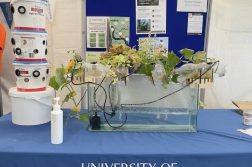As more people than ever move into large urban areas in search of jobs and opportunities, we often find a renewed appreciation for the relaxing atmosphere, beautiful scenery and clean fresh air that nature provides in forests.
In places like South Korea and Japan, recreational trips to the forest (Shinrinyoku, or ‘forest bathing’) for overworked urbanites are often a go-to prescription for depression and anxiety. It has been reported that forest bathing decreases blood pressure and glucose levels, and reduces the production of the stress hormone cortisol. It also reduces hyperactivity of the brain’s prefrontal cortex and stabilises autonomic nervous activity, which also reduces stress at the physiological level.
Forest bathing also has many implications for long-term health and disease prevention; multiple studies have pointed to Shinrinyoku inducing upregulation of immune Natural Killer Cells that act against tumours and other pathogens. This occurs through the release by NKC’s of toxic enzymes that induce cell death in disease-causing bodies. In a primary study conducted by Tokyo- and Stanford-based medical researchers, they found that while a trip to one of the national Japanese ‘healing forests’ did not increase numbers of white blood cells (the body’s primary immune defence system), they did see an increase in numbers of other immune bodies like lymphocytes (anti-cancer proteins), monocytes and NKC’s. They also recorded an increase in NKC activity in the body, while standardised scores for depression, anxiety and anger were decreased in the test subjects.
It is unclear exactly which factors in the forest environment improve health this way, especially when compared to city life, but it is speculated that aromatic substances and oils emanating from tress are a prime contributor. These include a-pinene and d-limonene, often referred to as phytoncides, which were shown to improve immune functions in the lab setting. Citrus fragrance was also shown to modulate human endocrine and immune systems to benefit the body. Although the authors observed beneficial activity exerted by short-term exposure to phytoncide through Shinrinyoku, they noted that further epidemiological and larger long-term population studies were necessary to confirm any beneficial effects on human immune function in the future.
With the increasing Western interest in ‘alternative medicine’ and health promotion, particularly in the context of increasing physical inactivity and chronic stress in the workplace environment, human beings can use their emotional affiliation to forest environments (demonstrated in psychological studies), to bring about stress reduction, depression alleviation, and psychological relaxation. And since walking, the most common form of physical activity, is becoming increasingly important in the prevention of cardiovascular diseases and other health issues, perhaps a trip to the Common is in order!



